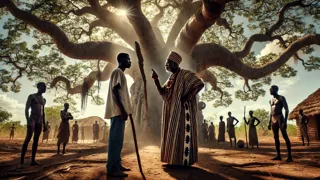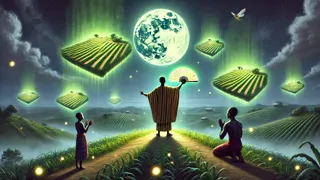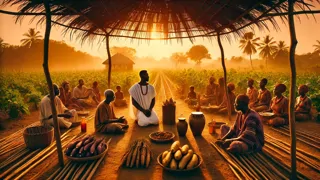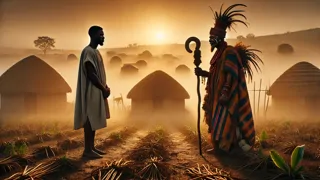Introduction
In a remote Yoruba village perched on the shimmering banks of the mighty Ogun River, dawn unfurled gentle ribbons of light across acres of green yam fields, painting the mist in gold. For generations, two farmers had worked adjoining plots separated only by a low earthen ridge—Adebayo, known for meticulous seed selection, and Tunde, celebrated for ancient rituals meant to bless the soil. Though neighbors in blood and land, they had never found common ground, each convinced his own seeds and prayers would summon the richest harvest. When rainclouds gathered at the horizon and the planting season commenced, Adebayo and Tunde stepped into the misty farmland at sunrise, ready to imbue their seeds with hope and skill. Yet beneath polite greetings and careful plowing, a quiet tension simmered, as each man silently weighed the other’s methods and quietly doubted their worth. Unbeknownst to them, Eshu, the mysterious trickster deity of fate and chance, watched from the shadows of a towering iroko tree. Known to weave mischief into mortal affairs, Eshu delighted in revealing hidden truths through challenge and surprise. On this day, he sensed an imbalance in the farmers’ hearts: stubborn certainty that blinded them to alternate wisdom. With a softly cracking voice that echoed like distant thunder, Eshu chose to reveal himself, offering a test of perspective that could either unite the farmers or leave them divided forever. The air trembled with a promise of change, carrying the scent of wet earth and ripe yams. In that moment between night and day, boundaries between mortal resolve and divine design grew thin. Such moments were Eshu’s favorite canvas, where the unpredictable brushstrokes of fate found fertile ground. The stage was set beneath a canopy of golden light and looming thunderheads, where destiny would bend beneath the playful whim of a chaos deity.
The Seeds of Discord
At dawn, the first rays of sunlight brushed the emerald canopy of the farmland like a painter’s gentle stroke. Adebayo bent low over his tilled soil, examining each seed as though it were a precious gem, while Tunde circled his own earth with solemn chants that rose in rhythm with his heartbeat. The two fields shared the same ridge, yet felt worlds apart—one tended with calculated precision, the other with reverent ceremony. Soft mist curled around swaying stalks of millet and yams, and the air carried the promises of growth and abundant life. A family of ibises waded through a knee-deep lagoon along Adebayo’s boundary, their calls rising above the faint rustle of leaves. For years, the farmers had prospered side by side, offering trays of fresh produce at weekly markets in the village of “Oke Idi”, but mutual respect had always been overshadowed by rivalry. Neither man wasted words at first light: the fields would speak for themselves when the rains released their silver tears onto the earth. Still, each held a silent doubt about the other’s methods, suspecting hidden flaws in distant customs or unshared knowledge. Along the ridge, tiny anthills clustered like miniature villages, each marking a secret path carved by tireless insects. The pungent scent of cow dung mulch mingled with the faint sweetness of dew-soaked yam vines. At the edge of the ridge, a lone ibadan-scented sandalwood stump served as an altar to Orunmila, the deity of wisdom, honestly ignored by both. This place, hallowed by tradition, seemed destined to witness another clash of human hubris. Beneath the golden light, pride took root in their hearts as surely as seeds found lodging in the earth below.

Later that morning, the two farmers met under the sprawling arms of an ancient baobab, its gnarled roots twisting like serpents across the red soil. Adebayo raised his hand in greeting but saw in Tunde’s narrowed eyes a flicker of disdain. “Your seeds will drown in our coming rains,” he said with casual confidence. Tunde replied, voice calm but edged with steel, “Your precision is a tool of fear; mine is a prayer woven into the very air. We shall see which carries more weight when the waters fall.” As they spoke, firefly larvae wriggled beneath the bark, and a distant rooster’s crow drifted on the breeze. A single drop of sweat traced Adebayo’s temple as the sun climbed skyward, and every word between them seemed to carry the force of a rainstorm yet to break. Above them, high clouds formed a braided crown, and in the shadows beyond, Eshu’s laughter glimmered like lightning. The villagers who passed by glanced with worry at the escalating tension, recalling old tales of neighborly love twisted into bitter rivalry. None dared intercept the farmers’ verbal joust; they believed the dispute lay beyond mortal interference. So the men stood locked in disputation, each convinced he held the missing key to a perfect harvest.
Eshu had watched enough. As Tunde adjusted the length of his ritual staff, the air itself seemed to twist, and a soft, chanted harmony wrapped around the clearing. Suddenly, a figure stepped from behind the baobab: clad in mismatched robes stitched from kente cloth and animal hide, he carried a carved staff topped with the face of a horned animal. His eyes glittered with equal parts mirth and challenge. “Farmers of Oke Idi,” he called, voice both gentle and insistent, “why do you pit your labor against one another when your bounty could grow under a single purpose?” Adebayo and Tunde froze, uncertain whether to bow or bristle. The stranger raised a slender hand, revealing a palm marked with the winding paths of pennonciferous roads. “I am Eshu, messenger between realms, keeper of chance and guardian of doors unseen,” he declared. With each syllable, the wind stilled and the crows fell silent. A rustle in the millet whispered like ancient ghosts, and both farmers felt a cold thrill of dread wash over them. The presence of a deity among mortals was both a blessing and a warning—one false move could tilt their fate forever. Yet in Eshu’s smile lay a rare invitation to humility, the first seed of wisdom neither man had yet planted. Under his boot, a tangle of fresh dance offerings—yams, palm wine, and chicken feathers—lay unclaimed, waiting for recognition. The whole clearing seemed suspended in a fragile dance between reverence and fear.
Rather than chastise, Eshu extended a slender finger toward the ridge that divided their plots. “Compete by harvest and method, then return in three moons,” he instructed. “Let each plot rest empty, while you take seats on opposite ends, bearing witness to the fruits of your choices. I will walk between your fields and name a winner, or reveal a truth beyond contest.” Adebayo’s chest rose with pride and hesitation. He recalled the precise pattern in which he had sown his seeds, every row equidistant like spokes on a wheel. Tunde’s thoughts drifted to the clay bowls of sacred charcoal mixed with water, poured over each seed to invoke fertility. They met Eshu’s gaze, hearts pounding like talking drums, and realized that blind certainty would no longer earn favor beneath such a gaze. After a long pause, each man nodded in solemn accord, a pact sealed not by words but by the weight of divine scrutiny. Between them, the air hummed with possibility and dread. Eshu turned away, his robes swirling with the rising wind, and the farmers felt their shared world change.
In the days that followed, Adebayo and Tunde retreated to their separate corners of the ridge. Adebayo spent long hours studying soil pH and testing water levels, mapping every contour with the measured patience of a scholar. He filled leather journals with rows of numbers and scribbled notes on sun patterns, believing that knowledge held the final answer. Not far away, Tunde gathered his family at dusk to sing lullabies for the seedlings and whisper prayers under moonlight. Each chant rose in soft crescendos through the palm grove, calling on ancestors to bless the land with unseen hands. Villagers watched the contrasting rituals with growing curiosity and unease, as children whispered that the gods themselves might stake their claim. By day, the fields lay fallow, waiting for the moment when the farmers would walk them once more. The ridge that once divided earth now separated two visions of nurture—one rooted in analysis, the other in devotion. Even the cattle grazing beyond seemed drawn to the tension in the air, their soft lowing a background note to the silent contest unfolding.
The Mirror of Illusion
As the first moonlit night approached, Eshu returned to the ridge bearing neither staff nor mask, but a simple palm leaf fan that gleamed with ethereal light. Summoning both farmers, he led them to the crest where their fields met and bade them close their eyes. The air around them shimmered like heat-waves rising from sun-beaten stone, though the night was cool and still. When Tunde and Adebayo opened their eyes once more, they found themselves standing before twin reflections of their farmland—mirrors of soil and seed suspended in midair. Across the floating plots, rows of sprouting green stretched toward an unseen horizon, twisting skyward in slow-motion dance. Eshu’s voice slithered through the silence, “Behold the fruit of certainty—each choice unlocked as an unfolding promise.” Neither farmer spoke, awe rooting their feet as lightning bugs danced like scattered stars in the quiet gloom. In this silent realm, the boundary between reality and trickery blurred; the twin fields hovered above the ridge, each a perfect copy of the other.

Stepping forward, Adebayo reached for the grass at his feet, only to withdraw his hand in surprise as the blades blurred beneath his touch. Tunde approached his reflection with crossed arms, brow furrowed, and spoke a grateful hack of a prayer that seemed to reverberate with truth. With each uttered word, the mirrored plants quivered—leaves pointing like attentive ears. Eshu circled them slowly, eyes gleaming: “Which soil is richer? Which prayer is stronger?” The farmers turned to one another, uncertain whether to trust what their senses revealed. In the distance, a hush fell over the forest canopy, as if even the night creatures held their breath. A bubble of tension grew between the farmers, yet each could no longer claim cause to doubt his own method without acknowledging the other’s equal validity. Tunde’s heart thumped with unspoken wonder, while Adebayo’s mind raced to find flaws in the vision—weak soil, uneven sprout patterns, anything to break the spell of shared potential. For the first time, they felt the weight of dual possibilities swirling around them like dancing fireflies, each glowing with a promise. The ridge beneath their feet pulsed softly, urging them to choose.
With a sudden clap of invisible thunder, Eshu raised his arms and shattered the reflections like a pot struck by a hammer. Soil rained down in slow arcs, dotting the farmers’ robes with black specks. Adebayo and Tunde staggered backwards, blinking as the real fields snapped back into view, lit by the pearly ribbon of the moon. Eshu’s laughter trickled through the clearing, playful and sharp as fractured glass. “The finest fields can be seen through many eyes, but only one truth lies within your hearts,” he murmured. Adebayo’s pulse still raced, while Tunde steadied his breath, both grappling for meaning in Eshu’s riddle. Leaves whispered overhead, and somewhere a solitary owl swiveled its head in silent appraisal. The farmers looked at one another, the old ridge between them suddenly feeling thinner than a strand of spider silk. In that moment, memory of past arguments seemed hollow, antiquated like brittle pottery shards. A new awareness settled into their bones: the harvest tested not only skill or faith, but shared perspective tempered by humility. Eshu’s eyes, glinting with secret delight, offered a silent nod that urged them forward into the next chapter of their trial.
The next dawn found the farmers kneeling side by side, hands deep in loam, weaving a single line of yams down the center of the ridge. Guided by Eshu’s earlier demonstration, Adebayo placed each seed with both precision and a whispered blessing, while Tunde caressed the fertile earth in a rhythm that felt part drumbeat, part song. The sun rose, washing the field in ribbons of pink and lavender, and for a moment, all that existed was the shared pulse of creation between their fingers. Villagers peered from behind mud-brick doors, eyes bright with cautious hope as tales of the night’s marvel spread like wildfire. In that joint act of planting, the farmers discovered something neither had understood alone: that skill and devotion together wove a harvest tapestry stronger than either thread alone. A gentle breeze carried laughter from distant children, as though the land itself celebrated unity in motion. Eshu, reclining beneath the baobab painted in dawn’s glow, tapped his staff with rhythmic staccato, like an invitation to further wonder. Neither man spoke, for words would have clattered like loose stones along the ridge; instead, they sowed in silence, hearts softened by the subtle miracle of shared labor. Between every handful of earth, they glimpsed a future sown by respect and cooperation.
When the rains finally burst overhead like a breached river, torrents plummeted onto the ridged line of seeds, knitting soil and seed in a baptismal surge. Adebayo shielded his eyes while Tunde lifted his face to the deluge, laughter erupting from him like a child’s blessing. Eshu danced between the fields, feet bare in the rain, trailing ribbons of brightly dyed cloth that fluttered like fire. In each drop, the farmers saw both the triumph of knowledge and the promise of faith, swirling together in patterns neither could unweave. Later, mud-slick boots and sodden clothes were exchanged for warm firesides as harvest festival drums beat in the village square. The two farmers, now colleagues in the work of fate, exchanged quiet words beneath lantern glow, forging a bond nurtured by trial and perspective. Above them, the moon carved a silver path through parting clouds, guiding weary souls toward newfound clarity. The rains fell on every corner of the land, but only those hearts open to change reaped the richest yield. Eshu faded into the night, his grin lingering like sweet honey on eager lips, certain that his lesson had been sown deep. And though the path ahead remained winding, neither farmer would ever regard the other’s soil as anything less than sacred.
Harvest of Understanding
In the weeks that followed the festival, word of Eshu’s spectacle spread beyond Oke Idi, rippling through neighboring villages like a joyous contagion. Adebayo and Tunde returned to their fields not as rivals but as custodians of a shared promise. Each morning, they exchanged notes on soil conditions, rainfall patterns, and the slow dance of seedlings. Villagers marveled as the once-distant farmers laughed together, comparing methods with genuine curiosity, not scorn. Among rustling maize stalks and quiet yam vines, an unspoken pact formed—a covenant that knowledge alone could not conquer earth’s mysteries without the patient embrace of wonder. On the ridge, scarred by arguments of the past, the farmers planted a single game of dual-clustered seeds, weaving fertilizer and ritual in alternating rows. Behind them, wild sunflowers nodded like attentive crowds, and the air pulsed with the promise of unity grown more vibrant than any solitary triumph. Even the elders crowned with silver hair nodded in approval, remembering times when cooperation had unlocked abundance for their ancestors.

As the golden harvest approached, pilgrims from distant homesteads arrived to witness the ridge of dual fields, now heavy with pods and tubers. They arrived under banners woven from kente threads, bearing gifts of kola nuts and woven baskets. Eshu’s tale had arrived as a seed of its own, sprouting hope among wandering farmers whose eyes had grown dull with failed experiments. Tunde and Adebayo, once straining at the boundaries of their own beliefs, offered tours of the fields with open hands, pointing out how each method enriched the other. By midday, laughter and chatter swelled like harvest bells, and the air buzzed with the shimmer of cicadas in lashed blades of grass. At the center of the ridge, villagers constructed a low altar of clay and fresh yams, lighting palm torches that flickered like distant drums. Adebayo placed a small clay bowl of rainwater at its base, and Tunde laid a handful of sacred charcoal beside it, symbols of each farmer’s gift to the land. Together, they knelt beneath Eshu’s watchful stars and gave thanks to the winds of chance that had guided them toward understanding. The night reverberated with song, as every voice, young and old, joined in the chorus of unity borne from diversity.
When the sun finally set on the last day of harvest, the villagers of Oke Idi gathered beneath a wide canopy of woven reeds, ready to share the fruits of a season born from collaboration. Flickering flames cast dancing shadows on the jagged silhouettes of manioc leaves and maize husks. Jars of fresh palm wine passed slowly from hand to hand, and plates of golden yams glistened in communal offerings. In the center, Adebayo and Tunde knelt side by side before the altar they had filled with the firstborn of their fields. With unified voices, they recited blessings learned from Eshu’s challenge—prayers that acknowledged both calculation and faith, science and song. The villagers responded in unison, their voices weaving a tapestry of gratitude that hummed louder than any drum. All at once, the night felt broader, as if the sky had stretched to embrace every story born from a single ridge. Somewhere in the darkness, a lone owl hooted in quiet applause, and a soft breeze carried whispers of future harvests to come. Under that shared night sky, no soul remained untouched by the invisible threads woven through every seed and prayer.
In the days that followed, travelers arrived bearing gifts of grains and seeds from other homesteads, eager to replicate the miracle of Oke Idi. Adebayo taught them how to analyze soil patterns, while Tunde demonstrated the sacred chants that lent each grain its voice. Villagers sat in circles around flickering lanterns, scribbling notes into leather-bound journals and murmuring prayers. Eshu’s name echoed in every corner—sometimes whispered with reverence, other times spoken with cheeky laughter. The deity of chaos had become a teacher of unity, his lessons carried by winds across distant hills and rivers. As seeds traveled beyond the ridge, so did the promise that perspective could break the hardest soil in human hearts. In the low hum of shared labor, both knowledge and devotion found room to breathe. Oke Idi’s soil, once a stage for rivalry, had transformed into a foundation for collective prosperity.
Years later, long after the farmers had joined their ancestors, bards still sang of the day Eshu walked the ridge, scattering seeds of perspective that germinated beneath every horizon. Oke Idi’s children learned two rituals by heart: the meticulous inspection of seeds at dawn and the evening chant that bound earth and sky. During every planting season, the ghostly laughter of a trickster deity seemed to dance between yam rows, reminding them of the fragile balance between certainty and humility. And though the fields lay in different hands, the tradition endured: a ridge of unity carved by the hands of those who chose to see each other’s worth. In every harvest, they offered first fruits on an altar of clay and charcoal, a silent pact with chance that fate was shared and never hoarded. The lesson of the two farmers became more than a local legend—it became a living covenant for every soul who tilled the earth with open mind and trusting heart.
Conclusion
In the tapestry of Yoruba lore, Eshu embodies the dance between order and chaos—between what we believe and the truths we are yet to uncover. The story of Adebayo and Tunde stands as a testament to the perils of narrow sight and the power of shared vision. When the farmers met across a simple ridge, neither foresaw how pride could fracture not only fields but the bonds between people. Only the playful mischief of a trickster deity could shatter their certainty and reveal the fertile ground beneath humility. Their journey teaches us that every perspective holds a fragment of truth, and only through curiosity and respect can those fragments unite into understanding. In our own lives, we often cling to single narratives, convinced we alone hold the map to success. Yet when we pause to listen—to another’s voice, to the whisper of the earth, or to the gentle hand of chance—we open doors to lessons that flourish far beyond expectation. May we all remember Eshu’s riddle that harmony stems not from rigid certainty, but from the art of seeing the world through many eyes. Let each harvest teach us that unity grows when we honor both method and spirit.

















